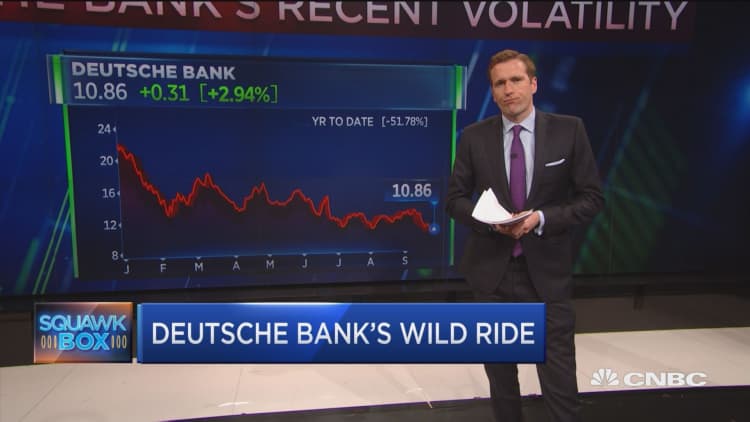
Shares of Deutsche Bank hit record lows this week on mounting concerns about the survival of the struggling German lender.
In the past two weeks, it has been hit with billions in fines from the U.S. Justice Department and reports that the German government won't be helping the ailing bank.
Since a peak in July 2015, shares have fallen more than 65 percent and the stock has erased more than half of its market value, from nearly $50 billion to about $16 billion this week. Meanwhile, net revenue fell almost 21 percent in the first half of this year from last year, according to the company's interim report.
A major concern for global markets about Deutsche Bank is its deep connections to global financial institutions, which has some investors fearing a larger bank crisis, though analysts continue to indicate that the situation is nowhere near so dire.
Here are the key points of the accelerating crisis from over the last 18 months:
June 2015 — John Cryan, formerly chief financial officer of UBS, is appointed co-CEO.
October 2015 — Cryan announces details on a restructuring program called Strategy 2020 that includes a suspension of dividends on common equity, job cuts and exits from 10 countries.
Source: FactSet
June 2016 — The International Monetary Fund releases a report saying that Deutsche Bank "appears to be the most important net contributor to systemic risks in the global banking system."
Spillover from Deutsche Bank to globally systemically important banks
Source: IMF. Staff calculations based on the Diebold and Yilmaz (2014) methodology and daily equity returns from Oct. 11, 2007, to Feb. 26, 2016. Groupe BPCE and the Agricultural Bank of China (ABC) not included due to lack of public traded data and short sample size.
July 2016 — S&P Global Ratings lowers its outlook on Deutsche Bank to negative, citing challenges management faces in implementing its restructuring strategy, while affirming a "BBB+/A-2" credit rating.
June/July 2016 — Deutsche Bank's U.S. unit fails the U.S. Federal Reserve's stress test again, but narrowly passes the European banks stress test.
However, Credit Suisse analyst Jon Peace said in a Sept. 16 report that Deutsche Bank's Common Equity Tier 1 ratio, a measure of a bank's financial strength, is below the European Central Bank's full minimum requirement of 12.25 percent and management's target of at least 12.5 percent.
Capital ratio versus regulator requirement (as of the second quarter '16)
Source: Credit Suisse, company data
August 2016 — Deutsche Bank and Credit Suisse are removed from Europe's blue-chip STOXX Europe 50 index due to the sharp decline in the market value of both stocks.
September 2016 — Shares of Deutsche Bank hit all-time lows before bouncing back 2 percent in New York trade Wednesday following a report that raised hopes of a rescue for the struggling bank. But both Cryan and the German government say they aren't working together on a plan for state aid, according to other reports.
Where things stand now
Analysts also do not expect government support will come at this point, or that it will even be necessary. If Deutsche Bank can negotiate its $14 billion settlement with the Justice Department down to the estimated sub-$5 billion figure, it may buy time for its attempt to restructure.
Fitch said last week that it expects the final settlement with the department to be far lower and "much more in line with provisions the bank has already set aside."
"There are no rating implications at this stage, but if the size of the final settlement turns out to be materially more than the provisions made, this could result in negative rating action," Fitch analysts said.
Deutsche Bank is also trying to sell assets in an effort to raise capital. On Wednesday, the bank announced that it will sell its British insurance business Abbey Life to Phoenix Group for 935 million pounds ($1.2 billion).
"This isn't Lehman, this isn't 2011 with Greece and some of the other euro issues. We've had a lot of cleanup since then," Rebecca Patterson, managing director and chief investment officer at Bessemer Trust, said at a Bloomberg conference Wednesday.
IMF Managing Director Christine Lagarde told CNBC on Wednesday that she doesn't see Deutsche Bank "at a stage where state intervention is absolutely called for at the moment."
—CNBC's Jeff Cox contributed to this report.
Correction: This story was revised to correct that the peak for Deutsche Bank's stock price was in July 2015.


